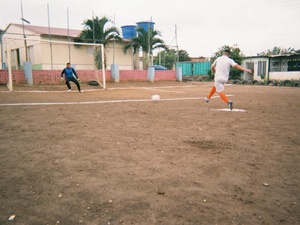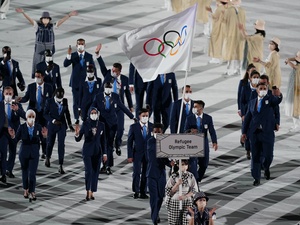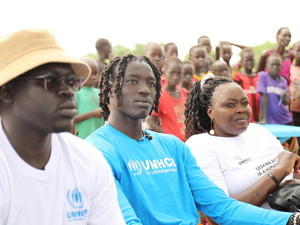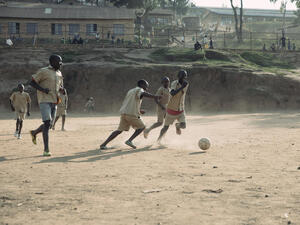These 10 refugees will compete at the 2016 Olympics in Rio
These 10 refugees will compete at the 2016 Olympics in Rio

For the first time, a team of refugee athletes will compete under the Olympic flag.
Since the modern Olympics began in 1896, over 200 national teams have vied for glory at the Summer and Winter Games. Now, for the first time, a team of refugees will compete as well.
The International Olympic Committee today announced the selection of 10 refugees who will compete this August in Rio de Janeiro, forming the first-ever Refugee Olympic Athletes team. They include two Syrian swimmers, two judokas from the Democratic Republic of the Congo, a marathoner from Ethiopia and five middle-distance runners from South Sudan.
“Their participation in the Olympics is a tribute to the courage and perseverance of all refugees in overcoming adversity and building a better future for themselves and their families,” said UN High Commissioner for Refugees Filippo Grandi. “UNHCR stands with them and with all refugees.”
The initiative comes at a time when more people than ever – 59.5 million at last count – are being forced to flee their homes to escape conflict and persecution. The squad representing them in Rio hopes to give the world a glimpse of their resilience and untapped talent.
Meet #TeamRefugees:
Rami Anis, 25, Syria, 100-metre butterfly
Rami Anis started formal swimming training as a 14-year-old growing up in Aleppo. He credits his Uncle Majad, who swam competitively in Syria, with instilling a passion for competing in the water. “Swimming is my life,” Rami says. “The swimming pool is my home.”
As bombings and kidnappings in Aleppo grew more frequent, his family put him on a flight to Istanbul to live with an older brother who was studying Turkish. “The bag I took had two jackets, two t-shirts, two trousers – it was a small bag,” Rami recalls. “I thought I would be in Turkey for a couple of months and then return to my country.”
“The swimming pool is my home.”
As months turned to years, he used the time to hone his swimming technique at the prestigious Galatasaray Sports Club. Yet without Turkish nationality, he was unable to swim in competitions. “It’s like someone who is studying, studying, studying and he can’t take the exam.”
Determined to prove himself, Rami rode an inflatable dinghy to the Greek island of Samos. Eventually he reached the Belgian town of Ghent, where he’s been training nine times a week with former Olympic swimmer Carine Verbauwen.
“With the energy I have, I am sure I can achieve the best results,” he says. “It will be a great feeling to be part of the Olympics.”
Yolande Mabika, 28, Democratic Republic of the Congo, middleweight
Fighting in the eastern Democratic Republic of the Congo separated Yolande Mabika from her parents when she was a young child. She remembers little else but running alone and being picked up by a helicopter that took her to the capital, Kinshasa. There, living in a centre for displaced children, she discovered judo.
Yolande went on to compete in major tournaments. “Judo never gave me money, but it gave me a strong heart,” she says. “I got separated from my family and used to cry a lot. I started with judo to have a better life.”
“Judo never gave me money, but it gave me a strong heart.”
In 2013, when she came to Rio to compete at the World Judo Championship, her coach confiscated her passport and limited her access to food – as he did at every competition abroad. Fed up with years of abuse, including being caged after losing tournaments, Yolande fled the hotel and wandered the streets searching for help.
Now, as refugee in Brazil, she has won a spot on the Refugee Olympic Athlete team and received training at the judo school founded by Flavio Canto, a Brazilian Olympic bronze medallist. “I will be part of this team and I will win a medal. I am a competitive athlete, and this is an opportunity that can change my life,” she says. “I hope my story will be an example for everybody, and perhaps my family will see me and we will reunite.”
Paulo Amotun Lokoro, 24, South Sudan, 1,500 metres
Just a few short years ago, Paulo Amotun Lokoro was a young herder guarding his family’s few cattle on the plains of what is now South Sudan. He says he “knew nothing” of the world except his own homeland, which had been at war for almost all his life. The effects of that conflict pushed him to flee to neighbouring Kenya, where he has developed new, grand ambitions: “I want to be world champion,” he says.
Living in a refugee camp, Paulo excelled in school sports, ultimately gaining a spot on the refugee squad now training near Nairobi under the guidance of Tegla Loroupe, the renowned Kenyan runner who holds several world records. “Before I came here I did not even have training shoes,” he says. “Now we have trained and trained, until we see ourselves at a good level, and now we know fully how to be athletes.”
“Before I came here, I did not even have training shoes.”
The effort paid off: Paulo is going to Rio. “I am so happy,” he says. “I know I am racing on behalf of refugees. I was one of those refugees there in the camp, and now I have reached somewhere special. I will meet so many people. My people will see me on the television, on Facebook.” Still, his aim is simple: “If I perform well, I will use that to help support my family, and my people.”
Yusra Mardini, 18, Syria, 200-metre freestyle
As the flimsy vessel started taking on water, Yusra Mardini knew what to do. Stranded off the Turkish coast with about 20 other desperate passengers, the teenager from Damascus slipped into the water with her sister, Sarah, and began pushing the boat towards Greece.
“There were people who didn’t know how to swim,” says Yusra, who represented Syria at the FINA World Swimming Championships in 2012. “It would have been shameful if the people on our boat had drowned. I wasn’t going to sit there and complain that I would drown.”
Yusra lost her shoes during that perilous sea crossing – a small price to pay for making sure lives were not lost. After arriving on the Greek island of Lesvos, she travelled north with a group of asylum-seekers, occasionally turning to people-smugglers.
“I want to show everyone that, after the pain, after the storm, comes calm days.”
Not long after arriving in Germany in September 2015, she started training with a club in Berlin, Wasserfreunde Spandau 04. Now 18, she is preparing to compete in the women’s 200-metre freestyle event at the 2016 Olympic Games in Brazil, as part of the Refugee Olympic Athletes team.
“I want to represent all the refugees because I want to show everyone that, after the pain, after the storm, comes calm days,” she says. “I want to inspire them to do something good in their lives.”
Yiech Pur Biel, 21, South Sudan, 800 metres
Yiech Pur Biel knew early on that if he wanted to make it in life, he would have to do so on his own. Forced to flee the fighting in southern Sudan in 2005, he ended up on his own in a refugee camp in northern Kenya. He started playing football there, but grew frustrated at having to rely so much on his teammates. With running he felt greater control over his own destiny.
“Most of us face a lot of challenges,” says Yiech. “In the refugee camp, we have no facilities – even shoes we don’t have. There is no gym. Even the weather does not favour training because from morning up to the evening it is so hot and sunny.”
“I can show to my fellow refugees that they have a chance and a hope in life.”
Yet he stayed motivated. “I focused on my country, South Sudan, because we young people are the people who can change it,” he says. “And secondly, I focused on my parents. I need to change the life they are living.”
Competing in the 800 metres at Rio, Yiech says, could help him to become an ambassador for refugees everywhere. “I can show to my fellow refugees that they have a chance and a hope in life. Through education, but also in running, you can change the world.”
Rose Nathike Lokonyen, 23, South Sudan, 800 metres
Until a year ago, Rose Nathike Lokonyen barely knew the talent she had. She had never competed, even as an amateur, after fleeing war in South Sudan when she was 10 years old. Then, during a school competition in the refugee camp in northern Kenya where she lives, a teacher suggested that she run a 10-kilometre race. “I had not been training. It was the first time for me to run, and I came number two,” she says, smiling. “I was very surprised!”
Rose has since moved to a training camp near the Kenyan capital, Nairobi, where she is preparing to run the 800-metre event at the Olympics. “I will be very happy and I will just work hard and prove myself,” she says. She sees athletics not only as an avenue to earning prize money and endorsements, but also as a way to inspire others. “I will be representing my people there at Rio, and maybe if I succeed I can come back and conduct a race that can promote peace, and bring people together.”
“I will be representing my people there at Rio.”
She is still worried about injuries, however. “That is my main challenge,” she says. Until recently, she was not training with professional running shoes, and had no professional guidance. She still seems surprised that, in little over a year, she has risen to this point. “I can do running as sport or, now I see, even as a career.”
Popole Misenga, 24, Democratic Republic of the Congo, middleweight
Popole Misenga was just nine years old when he fled fighting in Kisangani, in the Democratic Republic of the Congo. Separated from his family, he was rescued after eight days in the forest and taken to the capital, Kinshasa.
There, at a centre for displaced children, he discovered judo. “When you are a child, you need to have a family to give you instructions about what to do, and I didn’t have one. Judo helped me by giving me serenity, discipline, commitment – everything.”
“Judo helped me by giving me serenity, discipline, commitment.”
Popole became a devoted judoka, but each time he lost a competition his coach locked him in a cage for days with only coffee and bread to eat. Finally, at the 2013 world championships in Rio, where he was deprived of food and knocked out in the first round, he decided to seek asylum.
“In my country, I didn’t have a home, a family or children. The war there caused too much death and confusion, and I thought I could stay in Brazil to improve my life.”
After gaining refugee status, Popole began training at the judo school founded by Flavio Canto, an Olympic bronze medallist. “I want to be part of the Refugee Olympic Athletes team to keep dreaming, to give hope to all refugees and take sadness out of them,” he says. “I want to show that refugees can do important things.” He also hopes to catch the attention of his relatives back home. “I will win a medal, and will dedicate it to all refugees.”
Yonas Kinde, 36, Ethiopia, marathon
On a hill overlooking the city of Luxembourg, Yonas Kinde glides around the running track with determination and grace.
“I get power, and more and more power,” the Ethiopian marathoner says afterwards, a wide smile breaking out over his slender face. “I normally train every day, but when I heard this news [about the refugee team] I trained two times per day, every day, targeting for these Olympic Games. It’s a big motivation.”
Yonas, who has lived in Luxembourg for five years now, rarely stops moving. He’s been taking French classes regularly, and working as a sports masseuse to earn a living, all the while pushing himself to become a better runner. In Germany last October, he completed a marathon in the impressive time of 2 hours and 17 minutes.
“We can do everything in the refugee camp.”
But memories of fleeing his home remain uncomfortable territory. “It’s a difficult situation,” he says about life in Ethiopia. “It’s impossible for me to live there… It’s very dangerous for my life.”
For Yonas, the chance to run with the world’s best in Rio de Janeiro is much more than another race. “I think it will be the big message that refugees, young athletes, they can do their best,” he says. “Of course we have problems – we are refugees – but we can do everything in the refugee camp, so it will help refugee athletes.”
Anjelina Nadai Lohalith, 21, South Sudan, 1,500 metres
Anjelina Nadai Lohalith has not seen or spoken to her parents since she was six years old and was forced to flee her home in southern Sudan. As war closed in on her village, “everything was destroyed,” she says. Anjelina has heard that they are still alive, although “last year the hunger was very tough.” Helping her parents is her main motivation as she steps up her training ahead of competing in the 1,500-metre event in Rio.
As war closed in on her village, “everything was destroyed.”
She knew she was good at athletics after winning school competitions at the refugee camp where she now lives in northern Kenya. But it was only when professional coaches came to select athletes for a special training camp that she realised just how fast she was. “It was a surprise,” she says.
Now she wants to run well in Rio de Janeiro, and then earn places at major international races with significant prize money. “If you have money, then your life can change and you will not remain the way you have been,” Anjelina says. The first thing she would do with a big win? “Build my father a better house.”
James Nyang Chiengjiek, 28, South Sudan, 800 metres
At age 13, James Nyang Chiengjiek fled his home in what was then southern Sudan to avoid being kidnapped by rebels who were forcibly recruiting child soldiers. As a refugee in neighbouring Kenya, he attended school in a highland town known for its runners and joined a group of older boys training for long-distance events. “That’s when I realised I could make it as a runner – and if God gives you a talent, you have to use it,” he says.
At first, he did not have proper running shoes. Sometimes he borrowed footwear from others, but he won no matter what he wore on his feet. “We all of us got a lot of injuries because of the wrong shoes we had,” he says. “Then we were sharing. If maybe you have two pairs of shoes, then you help the one that has none.”
“By running well, I am doing something good to help others.”
When he goes to Rio, James aims to inspire others. “By running well, I am doing something good to help others – especially refugees,” he says. “Maybe among them are athletes with talent, but who did not yet get any opportunities. We are refugees like that, and some of us have been given this opportunity to go to Rio. We have to look back and see where our brothers and sisters are, so if one of them also has talent, we can bring them to train with us and also make their lives better.”
Alex Court contributed reporting from Belgium and Luxembourg, Luiz Godinho and Diogo Felix from Brazil, Josie Le Blond from Germany and Mike Pflanz from Kenya.



















